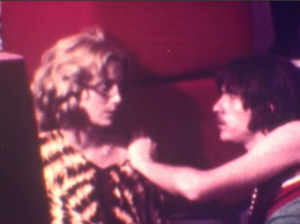
"Luz externa fue una de las producciones más ambiciosas del súper 8 mexicano. El guión se basaba en el monólogo de Ernesto, un machín jipiteca, que relata a un amigo las peripecias con su novia Raquel. Posteriormente el guión sirvió como la base del cuento con el mismo título que apareció como parte del libro El rey se acerca a su templo. Tanto la película como el cuento se abocaban a describir el abanico amplio de la juventud clasemediera urbana contracultural que había aparecido a fines de los años sesenta y principios de los setenta: los macizos que acceden al consumo de drogas, las muchachas de buena familia que se acercan a ese mundo, los nuevos conversos a la revolución social o los intelectuales que participan del ambiente con simpatía" (Vázquez Mantecón, 2012).
"Luz externa [External light] was one of the most ambitious productions of the Mexican super 8. The script was based in the monologue of Ernesto, a 'machin' hippie, that tells a friend about his adventures with his girlfriend Raquel. The script served later as the base for a short story with the same title that appeared as part of the book El rey se acerca a su templo [The king approaches his temple]. Both the movie and the short story described the wide range of the middle class urban countercultural youth that emerged at the end of the sixties and the beginning of the seventies: the strong men that had access to drugs, the girls from good families that entered that world, the new converts to social revolution or the intellectuals that sympathize with that ambiance" (Vázquez Mantecón, 2012).
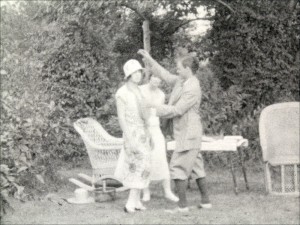
"Mag the Hag" is a 1925 amateur fiction film shot and edited by Hiram Percy Maxim (1869-1936), founder of the Amateur Cinema League. It is one of the earliest amateur fiction films shot on 16mm in Northeast Historic Film's collections. It features Maxim's daughter, Percy Maxim Lee, in the lead role of Percy Proudfoot. oldfilm.org
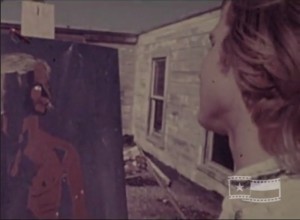
"This experimental film by Kenneth Anthony (credited as Ken Anthony) is a twist on the novel The Picture of Dorian Gray by Oscar Wilde. The main character, a young man, has a portrait of himself in a contemporary style. Over the course of the film, images of traditional paintings begin appearing on his body, much to his concern. After he leaves, his female companion is chased by the portrait. As more images appear on his body, the young man decides to destroy the portrait. He fails, however, and turns into a work of contemporary art himself. He is sent to a gallery by the women in the film, all of whom fall in love with the portrait. The final shot indicates that the portrait may come to life" Texas Archive of the Moving Image.
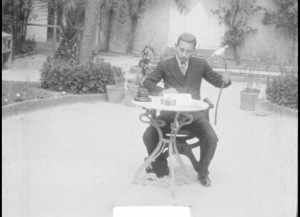
Paradoy of the avantgarde film culture of the era, including references to Salvador Dalí, Luis Buñuel, Joan Miró and dancer Àurea de Sarrà. It is interesting because it shows the crossed dialogue between these different film cultures that functioned beyond the realm of commercial cinema.
The noted female impersonator Charles Pierce is invited to visit to the home of Norma Desmond (of Sunset Boulevard [Billy Wilder, 1950]).
A "western spoof" noted to be filmed in the Blue family backyard, Portland, Oregon.
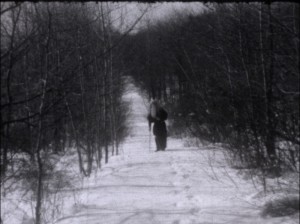
Amateur film club production that parodies Russian tragedy literature. The story revolves around two warring families, the Yagustynkas and the Chenstohovas, a romance, a religious curse, and murder. Exaggerated intertitles contribute to the film's "burlesque" of Russian culture and literature.
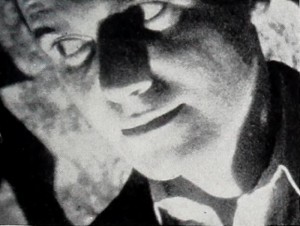
"Lon Wadman has done in This'll Kill You! what few movie makers who have tried it have achieved. He has filmed a farce that does not wander into other interpretive channels. His mockery of detective stories is accomplished with real humor, and the acting of the players is in like vein. The lighting is in proper melodramatic mood, but it leans toward underexposure. The film is presented with two phonograph records which were aptly chosen to supplement the theme. Mr. Wadman has kept his film brief, which is as it should be with this type of story." Movie Makers, Dec. 1945, 496-497.
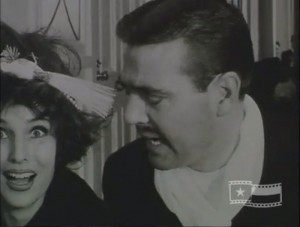
"This parody of a silent film was made for the El Paso Junior League to promote their Holiday Provisional Bash at the El Paso Club. Using black and white film and intertitles, the parody follows the Rich family’s Christmas morning where Rico Rich gives Rhonda Rich the same gift she gets every year - manure. When the couple attends the Jr. League Provisional Bash, a “Eureka!” moment occurs, providing the moral of the story: If you don’t want your husband to keep giving you that same old manure every Christmas . . . Come to the Provisional Bash” Texas Archive of the Moving Image.
Total Pages: 2